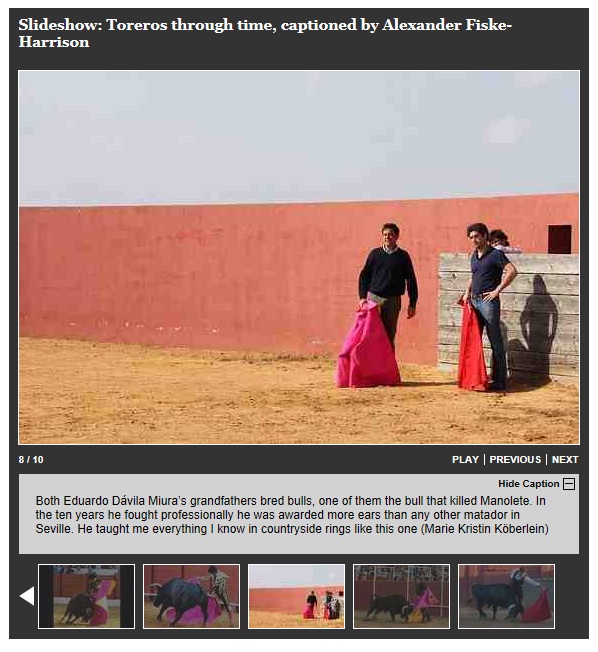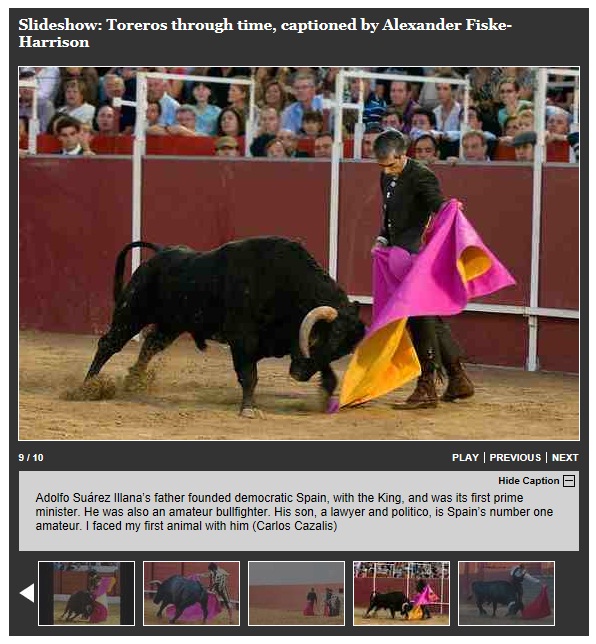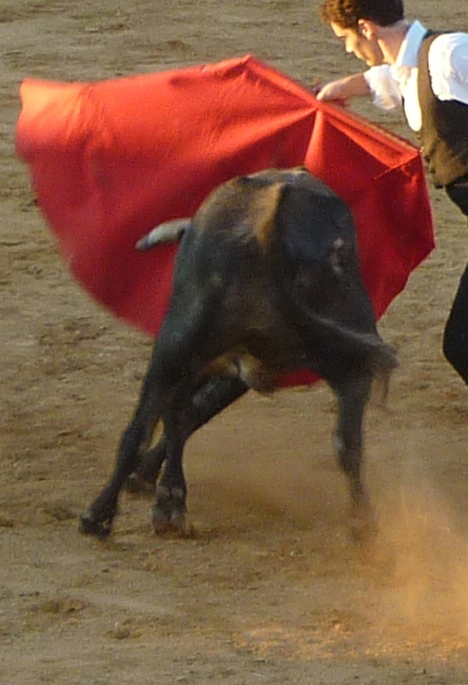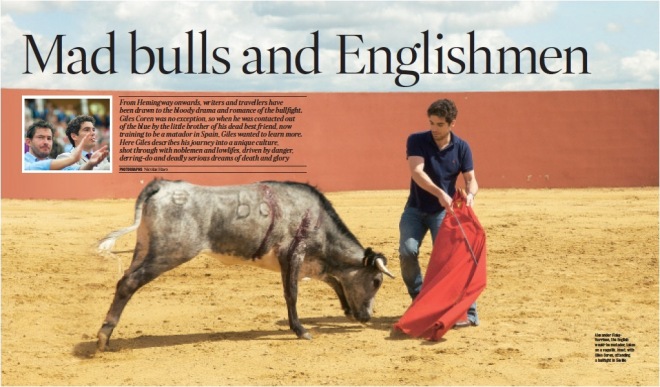 (Note: In the photo above, I am the one on the right. AF-H)
(Note: In the photo above, I am the one on the right. AF-H)
 (Note: In the photo above, I am leaning on the barrier on the left. AF-H)
(Note: In the photo above, I am leaning on the barrier on the left. AF-H)
In Search of the Spanish Bullfight
 (Note: In the photo above, I am the one on the right. AF-H)
(Note: In the photo above, I am the one on the right. AF-H)
 (Note: In the photo above, I am leaning on the barrier on the left. AF-H)
(Note: In the photo above, I am leaning on the barrier on the left. AF-H)
This blog was begun in October ’08 to keep track of my research into the world of bullfighting following my essay for Prospect magazine on the topic (to read it, see the ‘Page’ tab on the right hand toolbar, alongside pages on the author, the structure of the bullfight and a more scientific piece on the nature of the Spanish fighting bull.)
Since then I have watched 600 bulls toreado (‘fight’ is not the word, there is nothing fair here), run the bulls myself in Pamplona, danced alongside Spain’s flamenco dancers, trained alongside her matadors in the arena with young bulls and killed a single bull myself in a ring in Córdoba and written the entire experience as a book, Into The Arena: The World Of The Spanish Bullfight. It is available at all major British bookshops and at Amazon UK at a 50% discount by clicking here or a little less as an eBook by clicking here.
The book was shortlisted for the William Hill Sports Book of the Year 2011 and listed as essential reading for both the Summer and Christmas in the Sunday Times and Sunday Telegraph. As the reviewers said,
“Complex and ambitious, compelling and lyrical.” Mail on Sunday *****
“An engrossing introduction to Spain’s ‘great feast of art and danger’. Brilliantly capturing a fascinating, intoxicating culture” Sunday Times
“A compelling read, unusual for its genre, exalting the bullfight as pure theatre.”Sunday Telegraph
“He did not expect to fall in love with bullfighting, but then he had his eyes opened by the beauty, dignity and art of the sport.” The Times
“Thrilling. An engrossing introduction to bullfighting.” Financial Times
“An informed piece of work on a subject about which we are all expected to have a view.”Daily Mail
“Fantastic. A fascinating insight into a world we know little about but are quick to judge.” Metro
“An informative and breathtaking volume of gonzo journalism” The Herald (Scotland)
“Intoxicating. Pulses with the writer’s love of the world and the people he has found himself among.” The Australian (Australia)
“An entertaining account which seeks a demonstration of the values which distinguish bullfighting from butchery.” The Spectator
“Particularly good. Transposes spectacle into words with great success, conveying the drama with eloquence and precision.” Literary Review
“Acknowledges the morally questionable nature of the bullfight. Interesting explorations of fear, bravery and drive.” League Against Cruel Sports
“A larger than life character. Hugely enjoyable and easy read. Moving and instructive.” Club Taurino of London
“One of the most engaging books on the Bulls I have ever read. Feel every failure, every success, every thrill.” Taurine Bibliophiles of America
They also say,
“Although Fiske-Harrison develops a taste for the whole gruesome spectacle, what makes the book work is that he never loses his disgust for it.” (Daily Mail), “It’s to Fiske-Harrison’s credit that he never quite gets over his moral qualms about bullfighting.” (Financial Times), “Uneasy ethical dilemmas abound, not least the recurring question of how much suffering the animals are put through.” (Sunday Telegraph), “Fiske-Harrison admits that with each of his fights he knows more, not less fear. When he kills his first and only bull he feels not triumph but overwhelming sadness for a life taken.” (Mail on Sunday) and “The question of whether a modern society should endorse animal suffering as entertainment is bound to cross the mind of any casual visitor to a bullfight. Alexander Fiske-Harrison first tussled with the issue in his early twenties and, as a student of both philosophy and biology, has perhaps tussled with it more lengthily and cogently than most of us.”(Literary Review)
Website of the book here for full reviews.
What is on this blog is for those who have read the book and wish to go even further into the world of the bulls, which has now and forever become a part of my life.
Alexander Fiske-Harrison
My friend, the legendary matador Juan José Padilla who is the first four chapters of my book Into The Arena, whose terrible goring last year cost him an eye as detailed here, is confirmed to return to the professional arena in Olivenza, Spain, on the final day of the feria there on Sunday, March 4th.
The matadors who are to accompany him are two of greatest working today. Morante de la Puebla, the Divine Cape, is an artistic genius and a childhood friend of Padillas. The second is José María Manzanares, son of the great matador of the same name, who put in a performace last year which stunned Spain and elevated him to “man of the moment”. Only Julián López – El Juli - and José Tomás also fight at this level.
They will be facing the best bulls in Spain, Núñez del Cuvillo, whose cattle are known for their ferocity and courage (as I have experienced myself). It was one of their bulls, fought by Manzanares, who was pardoned for bravery in Seville last year – the first pardon in that discerning ring in half a century.
I will be at Padilla’s side in training on the ranch – my own return to the ring with cattle - and in the callejón - the bullfighter’s alley – at the plaza de toros itself.
Alexander Fiske-Harrison
A TALK tonight by Oxford bullfighter Alexander Fiske-Harrison has been cancelled.
Mr Fiske-Harrison mounted a fierce attack on Blackwell’s for cancelling the event, rescheduled to today after the Broad Street bookshop postponed the original talk because of security fears.
Mr Fiske-Harrison, 35, angered animal rights extremists after training to become a bullfighter and killing a bull in a ring in Spain, later describing his experiences in a book. The writer said the original lunchtime meeting two weeks ago was postponed after Blackwell’s informed him that they had received “a credible threat.”
But he has now accused Blackwell’s of overstating the threat, scaring people away from tonight’s rearranged talk.
Tony Cooper, manager of Blackwell’s, said: “After several conversations with Alexander Fiske-Harrison we decided to cancel the event due to the small number of tickets taken up. Despite initial interest in the lunchtime talk this did not carry forward into a full evening talk by the author.
“We are obviously disappointed that this is the case as we never like to cancel an event unless absolutely necessary.”
Mr Fiske-Harrison, 35, spent two years in Spain’s heartland of bullfighting with matadors and breeders, talking with fans and training to fight bulls himself.

Alexander Fiske-Harrison with a 3-year-old Saltillo bull.
Photo: Paloma Gaytán de Ayala (Santa Coloma)
On Thursday, February 9th, at 7pm I will be giving a talk on my book, Into The Arena: The World Of The Spanish Bullfight at Blackwell’s Bookshop on Broad Street, Oxford. Tickets are free and are available by calling 01865 333623.
Putting to one side the articles in the Oxford Times and Oxford Mail, which discuss an apparently needless postponement of the talk – Blackwell’s effectively caved into complaints and then misrepresented them to me as messages of a threatening nature so I would agree - it is still worth clarifying one point of fundamental importance. Into The Arena is not a piece of pro-bullfighting propaganda. And it’s not just me saying that. Here’s what the press said:
Shortlisted for

Fiske-Harrison’s argument that the interplay between man and bull, when done with the highest skill, merits the tragedy will not convince many readers. But his descriptions of the fights are compelling and lyrical, and his explanation of different uses of the matador’s capes is illuminating. One begins to understand what has captivated Spaniards for centuries. This complex and ambitious book examines not only life in the bullring but also Spain’s cultural identity and modern ideas of masculinity. Fiske-Harrison admits that with each of his fights he knows more, not less fear. When he kills his first and only bull he feels not triumph but overwhelming sadness for a life take.

Provides an engrossing introduction to Spain’s “great feast of art and danger”…brilliantly capturing a fascinating, intoxicating culture.
Uneasy ethical dilemmas abound, not least the recurring question of how much suffering the animals are put through. But this remains a compelling read, unusual for its genre, exalting the bullfight as pure theatre.
Fiske-Harrison did not expect to fall in love with bullfighting when he saw it for the first time in 2000. A philosophy student and member of the World Wildlife Fund and Greenpeace, he would argue with his brother about animal cruelty. But then he travelled to Seville and had his eyes opened by the beauty, dignity and art of the sport. Fiske-Harrison recounts his year spent studying the matadors, breeders, fans and the bulls themselves, set against the backdrop of the campaign to ban bullfighting in Catalonia.

Others have been there before, not least Ernest Hemingway, the 50th anniversary of whose death neatly coincides with this travelogue. Hemingway concluded that bullfighting was ‘moral’ as it gave him a ‘feeling of life, death and mortality’. Fiske-Harrison comes to much the same conclusion, albeit after considerable soul-searching… He develops a taste for the whole gruesome spectacle, but what makes the book work is that he never loses his disgust for it…
This is an informed piece of work on a subject about which we are all expected to have a view. But what I really enjoyed about Into The Arena is that after nearly 300 pages I still couldn’t quite decide whether bullfighting should be banned or allowed to flourish.”

It’s to Fiske-Harrison’s credit that he never quite gets over his moral qualms about bullfighting; the book is at its strongest when he uses his degree in biology to investigate the cruelty question… Into the Arena is full of intriguing detail… an engrossing introduction to bullfighting. [Read more...]
Following the temporary cancellation of my Oxford talk on my book Into The Arena and vastly exaggerated reports of death threats etc. abounding in the Oxford Times and Oxford Mail, I thought I would repost the talk I gave at the Edinburgh International Book Festival to show quite how virulently propaganda-like my talks tend to be. As my bullfight aficionado friends point out, if it is propaganda, it reads almost as though it is for the other side…
Yesterday evening I immensely enjoyed giving a talk to the sizeable audience at the 300-seat Scottish Power Theatre at the Edinburgh International Book Festival on my book Into The Arena: The World Of The Spanish Bulllfight. It was followed by a discussion with the chair, Al Senter, and the Q&A session with the audience that (along with brief personal chats with about half of those present who came to have their books signed by me in the London Review of Books tent afterwards.) The questions were all well-informed and interesting, not least because, as many of the audience members said to me in person, I’d answered most of their more general questions in my opening talk. So, here is the transcript of what I said:
I was going to read from my book, but it seems that the most important topic in the United Kingdom in the 21st Century - when discussing bullfighting - are the ethical issues surrounding the harm and killing of animals for a public spectacle. So I want to addresses this head on.
As a liberal, it is not my intention, or my place, to tell people whether or not they should approve of or enjoy bullfighting anymore than it is whether they should approve of or enjoy opera. However, when people seek to ban an art form from existing, so that other people may not enjoy it, then certain questions have to be raised.
Whatever the motivations behind the ban on bullfighting on Catalonia – and there have been accusations of underhand dealings, thumbing of noses at Madrid to gain votes, which has some circumstantial evidence for it as the popular Catalan regional hobby of attaching burning tar balls and fireworks onto bulls’ horns and letting them into the streets is unaffected by the legislation – anyway, the stated reason is the ethics, or rather lack of ethics, of bullfighting. So, that is what I should like to discuss here.
However, before I can do that, I have to dispel some myths that have long surrounded the bullfight, pieces of propaganda that have been propagated by the anti-bullfight lobby such as CAS International, the League Against Cruel Sports and PETA.
The one I most often hear is the complaint that the matador faces a broken down and destroyed animal. Take a close look at this bull in these photos and tell me how broken down it looks.
As an Australian citizen (dual-nationality with my British citizenship), I am very pleased to see that their best-selling national newspaper, The Australian has reviewed my book Into The Arena: The World Of The Spanish Bullfight in this weekend’s edition (online here: Death in the afternoon revisited by a beginner bullfighter | The …).
I think that the author, Matthew Clayfield, who refers heavily to Ernest Hemingway’s Death In The Afternoon as a strongancestral influence to my book has got it largely right – including in his criticisms.) Especially in his line on my ethical misgivings about bullfighting in the book:
While Fiske-Harrison eventually dismisses his qualms, it is difficult to read his final chapter, “La escotada” – the thrust of the matador’s sword – without getting a sense that his year with the bulls has only deepened their mystery. It certainly hasn’t put an end to his concerns. Or, one suspects, his searching for an answer.
I should add here, just to clarify, that despite press reports to the contrary, my talk at Blackwell’s Bookstore in Oxford has not been ‘threatened’ as such, and neither have I with regards to the talk. This was a miscommunication somewhere in the chain, as was the in-hindsight preposterous idea that the Thames Valley Police were aware of this and had failed to act.
I have myself received “death-threats” on this blog and elsewhere – although I have always found that phrase a little melodramatic, as I am neither dead nor feeling in the least threatened. Which is why I delete them, forget them and sleep easy at night. (Well, not quite: I dream, almost constantly, about bulls. My strangest – and most moving – dream about them opening chapter twenty of Into The Arena.)
Anyway, I will be talking at Blackwell’s at 7pm on Thursday, February 9th.
Alexander Fiske-Harrison
The photo of my one and only “bullfight” is enclosed below (Photo: Andy Cooke). A full discussion of the ethics – or lack of – in bullfighting is the next post in this blog.
This article of Giles Coren’s was originally published in The Times magazine on Boxing Day ’09 where it is still available along with Dominic Elliot’s film of our day bullfighting here. All photos are by Nicolás Haro.
 Alexander Fiske-Harrison, the English bullfighter, takes on a ‘vaquilla’ of the Saltillo breed. Inset: with Giles Coren, attending a bullfight in Seville.
Alexander Fiske-Harrison, the English bullfighter, takes on a ‘vaquilla’ of the Saltillo breed. Inset: with Giles Coren, attending a bullfight in Seville.
I am in a bullring. Not in the seats, in the ring. On the sand. From the relative safety of a wooden barrier with a small room behind it, built into the stone wall, I have seen four vaquillas, young cows, “caped” by one of Spain’s most famous matadors, the son of the first post-Franco prime minister of Spain, Adolfo Suárez Illana, and by Alexander Fiske-Harrison, the younger brother of my best friend at school, who died in an accident the year we left, three months before his 19th birthday. [Read more...]
On Tuesday, the poet Ted Hughes was commemorated with a monument in Poet’s Corner in Westminster Abbey, among the remains of Chaucer and Wordsworth, Dickens and Hardy (I have not visited myself since my brother’s memorial service there in ’88).
In the summer of 1956 Hughes married the poet Sylvia Plath and for their honeymoon they went to Spain and watched a bullfight. As she wrote in a letter to her mother:
I’d imagined that the matador danced around with the dangerous bull, then killed him instantly. Not so… The killing isn’t even neat, and with all the chances against it, we felt disgusted and sickened by such brutality.
I feel I would have had exactly the same response were it not for the fact that the first corrida I saw was headed by El Fandi, four days before his alternativa, in the Maestranza of Seville. Sheer chance.
Plath wrote a poem about her bullfight experience, in which a picador was injured by the bull. [Read more...]
FINALIST
Sadly, my book did not win the ‘Bookie Prize’ this year. That honour went to Ronald Reng’s A Life Too Short about the tragic suicide of his friend, Robert Enke, the German goalkeeper. Ronald gave a deeply moving impromptu speech, and then he, the champion cyclist David Millar (whose book Racing Through The Dark was also shortlisted) and I went for dinner. I would like to thank William Hill, Waterstones of Piccadilly, and all the other contestants (and my agent, publisher and girlfriend who were all present) for a great day. As I argued in my article in the Daily Telegraph on Saturday, I shouldn’t have won anyway. Here is the review their sister newspaper the Sunday Telegraph gave me the following day.
Alexander Fiske-Harrison
27.11.11
INTO THE ARENA: The World of the Spanish Bullfight BY ALEXANDER FISKE-HARRISON Profile Books, £15.99
Bullfighting was banned in Catalonia last year and yet has continued to capture both the quintessence of Spain and the extremes of sporting heroism. It exerted a fascination early upon Alexander Fiske-Harrison, who watched his first bullfight as a 23-year-old philosophy student in Seville and embarked soon after on a quest to understand the spectacle in all its cultural complexity. This is no passive work, however: he undertakes months of training with one of the top matadors, Eduardo Dávila Miura, to steel himself for the final act of his own corrida de toros. Uneasy ethical dilemmas abound, not least how much suffering the animals are put through. But this remains a compelling read, unusual for its genre, exalting the bullfight as pure theatre.
Blog at WordPress.com. · Theme: Minimum by StudioPress.

.gif)

.gif)
Recent Comments